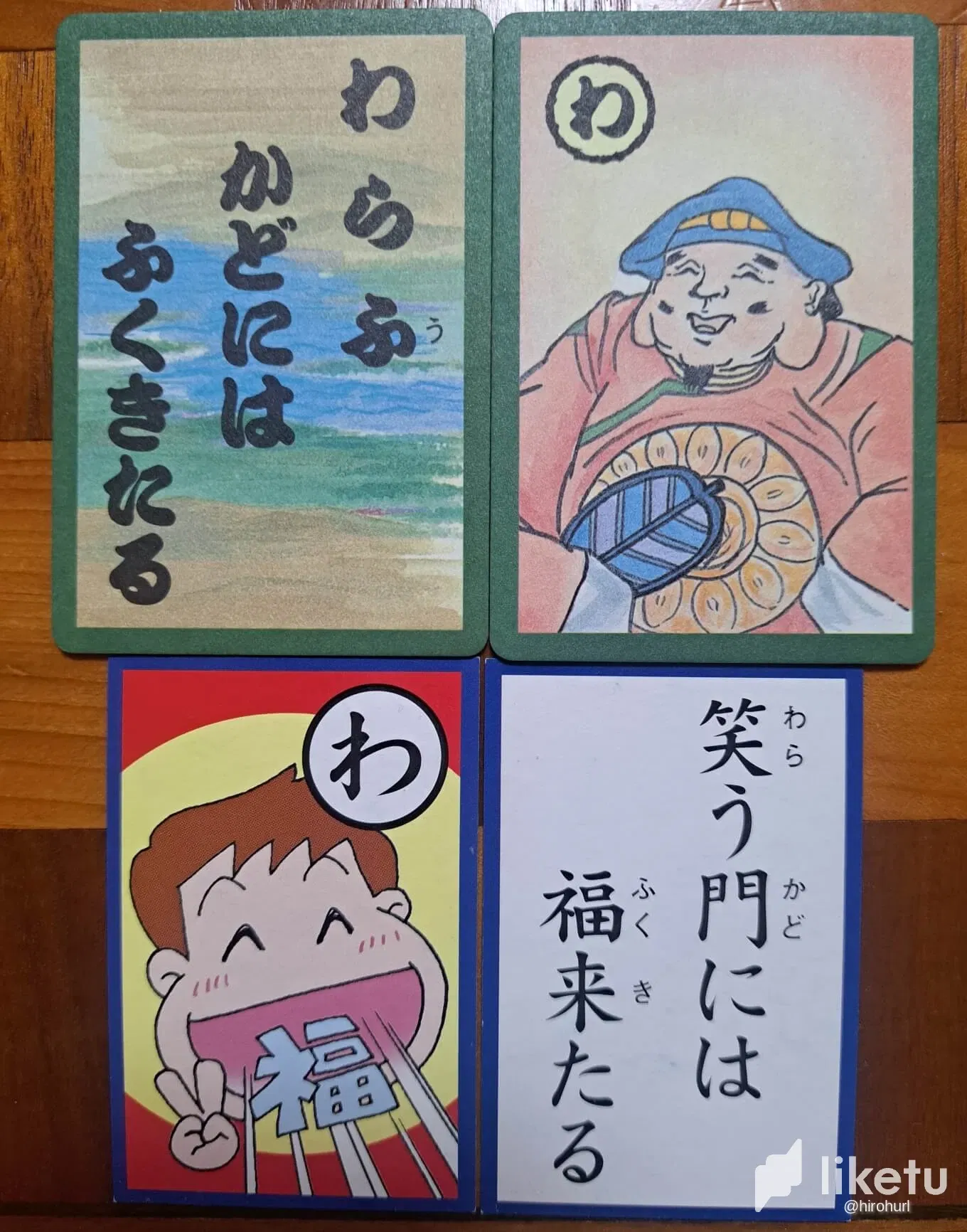
The merry Japanese merchant in the top illustration of the thirteenth Japanese proverb in the Iroha Karuta series reminds of the Nine of Cups tarot card, which, in the Morgan-Greer interpretation of the Rider Waite tarot, depicts a medieval European type of "merry merchant" beaming beneath nine goblets.
The thirteenth card illustrates "wa," the thirteenth syllable in the traditional Japanese "Iroha" syllabary.
The proverb goes like this:
笑う門には福来る
Warau kado ni wa fuku kitaru
Let's break it down:
笑う = warau = laugh
門 = kado = gate
に = ni = at (or "through" in this context: in this proverb "ni" indicates the direction or the destination of an action)
は = wa = with regard to. "Wa" is a common "topic marker"
福 = fuku = good luck / good fortune
来る = kitaru = approach - a more poetic sense than the plain form "kuru" = come.
My Translations
I made three translations of this proverb, and then made a final adjustment to the second one to get to my final version...
Translation 1
Good luck comes through the gate of laughter.
This is a basic translation that attempts to get the sense of the original in plain English.
Translation 2
Laughter is the gate through which good luck enters.
In this translation I stuck more closely to the original Japanese word order:
Warau kado = Laughter is the gate
ni wa = through which
fuku = good luck
kitaru = comes
I was quite pleased with that effort.
Translation 3
This is a more compact version that omits the verb:
Laughter is the portal of good luck.
My Final Translation: Catching the Word Order AND the Syllable Count!
I noticed that my second translation consisted of eleven syllables while the original Japanese consists of twelve syllables. I therefore decided to give the gate a more poetic feeling by calling it a "portal" to create a translation with the same number of syllables as well as the same word order:
Laughter is the portal through which good luck enters. = 12 syllables
Wa-ra-u ka-do ni wa fu-ku ki-ta-ru = 12 syllables
I Challenge ChatGPT to Translate the Proverb
I asked ChatGPT to "translate and talk about a Japanese kotowaza that is the 13th in the iroha karuta card series."
ChatGPT immediately got it wrong by translating the first (and most famous) proverb in the series, so I offered another hint:
"Actually, the 13th begins with "wa"..."
This time, it got it right, but I felt that the translation was a bit off:
笑う門には福来る
(Warau kado ni wa fuku kitaru)
Literal translation: "Good fortune comes to the house that laughs."
I suggested,
"doesn't "kado" mean gate?"
To which ChatGPT replied:
You're absolutely right! "Kado" (門) does indeed mean "gate" in Japanese, so a more literal translation of 笑う門には福来る (Warau kado ni wa fuku kitaru) would be "Good fortune comes to the gate that laughs."
Hmm. It's not a great translation, is it. It seems to think that a literal gate is literally laughing whereas "gate" is a metaphor for that which enables good fortune to "enter" one's life, namely, laughter.
What about Google Translate?
I finished off by plugging the Japanese proverb into Google translate, and it gave me this compressed, but clear, interpretation:
Laughter brings good fortune.
Well done, Google Translate! That translation does the job of conveying the essential meaning without getting caught in the gate!
Cheers!
David Hurley
#InspiredFocus
For the best experience view this post on Liketu